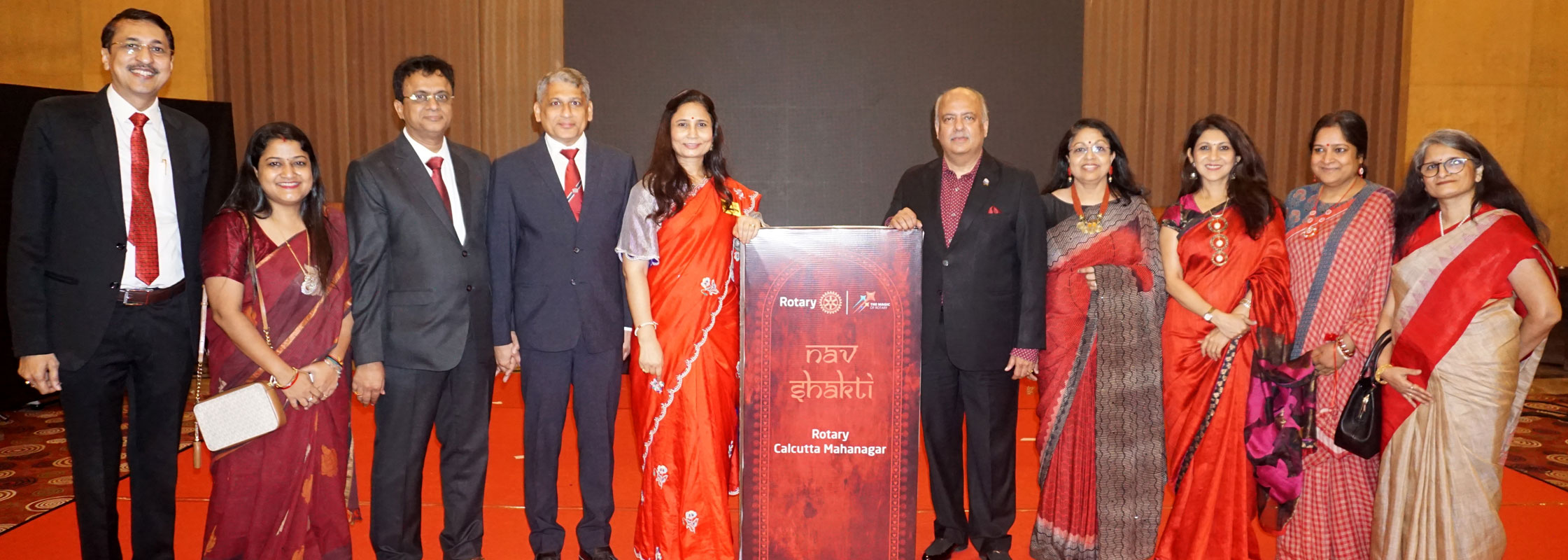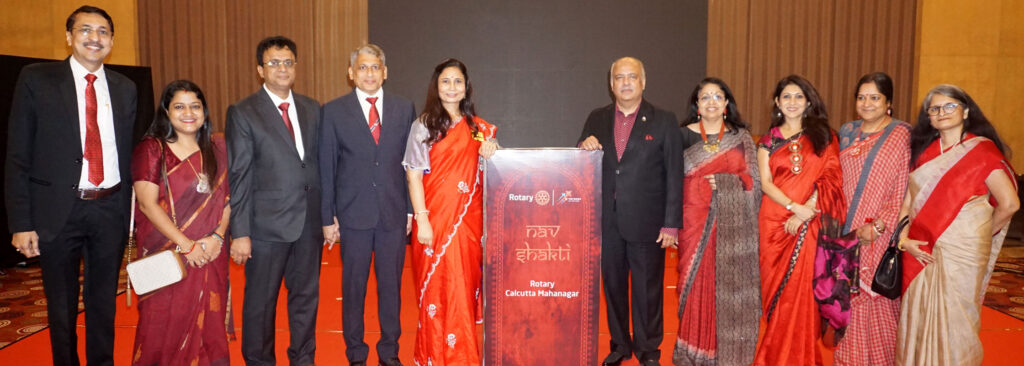
A mid the sea of protests across the country over the savage rape and murder of a young intern doctor at the RG Kar Hospital, Kolkata, Rotary Club of Calcutta Mahanagar, RID 3291, honoured nine women achievers with Shakti Samman Awards. “What has happened in Kolkata is against our culture as our sanskriti (Indian tradition) worships Goddess Shakti. Ahead of Durga puja, the nine-day festival where the nine avatars of the goddess are worshipped each day, we want to create a positive, vibrant mood for Navratri by hosting the Nav Shakti event,” said club president Pramila Dugar.
She mooted the idea of such an event which also included a panel discussion on empowering girls and the launch of Project Shakti comprising four service initiatives worth ₹50 lakh benefiting over 50,000 girls. “PRIP Shekhar Mehta structured and curated the programme that will help us to rejuvenate and recollect our inner strength,” she explained. In his address, Mehta recalled that as Rotary president “I had taken up empowering girls as my top priority and it resonated around the world as in most places, women faced discrimination, lacked opportunity for growth and struggled for education, healthcare and skill development.”
In fact, women should get half the job opportunities as “they form half of global population. But they are the most affected by issues like climate change, economic disparity and major disasters.” Mehta said Nav Shakti is an earnest attempt to look at gender disparities, find solutions through open discussions, and “then follow it up by walking the talk.” At the panel discussion anchored by Sudeshna Roy, advisor, West Bengal Commission for Protection of Child Rights, and also a film director-cum-actor, the focus shifted towards the systemic issues and social inequalities that women had to face in their daily life.
Citing a 2018 UN study on gender disparity, former Kolkata police commissioner Gautam Chakrabarti said “it reported that it would take 108 years for women to overcome inequality which is a global problem. Even wealthy educated families prefer a male child as gender disparities are deeply entrenched in our society.” Now police can file a ‘zero FIR’ by taking cognisance of online complaints of sexual harassment at the workplace. “There are gaps in the implementation of equity laws, and for this to change, we have to work at the family, society and government levels to remove gender discrimination,” he said.

Around 90 rapes are being reported each day in India, “and we all know that this is just the tip of the iceberg as many don’t come forward to lodge police complaints. We know that only women can give birth and breastfeed, but the rest of her work in nurturing the child should be shared by men too. Let us put the responsibility of bringing up children on men too,” said Anuradha Kapoor, founder-trustee, Swayam, an organisation that advocates women’s rights. To stop violence against women, “we have to ask what type of men and boys we have got used to in the first place,” she said. In a forceful plea, acting coach and film director Daminee Benny Basu said “we have to break free from the gender conditioning and stereotypes that are common in the film industry. Policies are framed by a patriarchal society, and the very idea of equality is being twisted by male chauvinists with statements like ‘boys will be boys.’”
The panellists agreed that the workplace should be “more accommodative of women’s concerns, but now she is being forced to ‘fit into it’. Also, we have to respect homemakers as without the household chores this world will come to naught.” Sudeshna Roy said that “each one of us should look back and within us to analyse where we have gone wrong and make efforts to make our society more gender inclusive.”
Pointing to a report of McKinsey Global Institute, event chairperson Chitra Agarwal said, “closing the gender gap in employment and other areas will add $28 trillion to the global GDP by 2025.” Only 1.4 billion out of 3.5 billion employed people in the world are women. “While 66 per cent of the global work (consolidated) and 50 per cent of food production are done by women, they get only 34 per cent of the global income,” she said.
Project Shakti
A slew of programmes including vaccination against cervical cancer for 1,500 girls, holding awareness and medical camps (₹20 lakh); creating MHM awareness sessions for 30,000 girls, training stakeholders and distribution of eco-friendly sanitary pads (₹12 lakh); promoting a model kitchen garden, orientation sessions for girls at anaemia camps and seed kits distribution (₹10 lakh); and self-defence training to 1,000 girls under Project Virangana (₹5 lakh) will be taken up by the Mahanagar Rotarians.
Nine awardees
The club got 82 nominations from across the state with a write-up of their work, 10–20 action pictures and bio-data, which were scrutinised by two eminent jurists — Satyam Roychowdhury, MD of Techno India Group, and Dr Kunal Sarkar, a cardiac surgeon, said award coordinator Aparna Biyani. “One woman was selected in each of the nine categories after careful vetting and deliberations by the jury,” she said.
The awardees are: Parul Bajoria, fashion designer, Arts and Culture; Priyanka Goenka, baby food and nutrition, Entrepreneurship; Anwesha Banerjee, fearless reporting, Journalism; Yasmin Nazia, criminal lawyer, Legal; Sharanya Banerjee, karate trainer, Martial Arts; Anasuya Chakraborty, community police officer, Police Service; Tahrina Nasrin, swimmer, Sports; Payal Varma, therapeutic practice, Social Service; and Soma Bose, writer and visual storyteller, Author. Each awardee was given a trophy, citation and a gift pack.
Pictures by V Muthukumaran






